Search the Special Collections and Archives Portal
Search Results
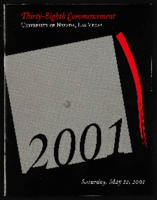
University of Nevada, Las Vegas (UNLV) 38th commencement program
Date
Archival Collection
Description
Commencement program from University of Nevada, Las Vegas Commencement Programs and Graduation Lists (UA-00115).
Text
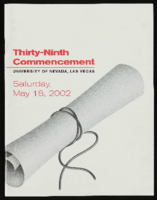
University of Nevada, Las Vegas (UNLV) 39th commencement program
Date
Archival Collection
Description
Commencement program from University of Nevada, Las Vegas Commencement Programs and Graduation Lists (UA-00115).
Text

University of Nevada, Las Vegas (UNLV) 29th commencement program
Date
Archival Collection
Description
Commencement program from University of Nevada, Las Vegas Commencement Programs and Graduation Lists (UA-00115).
Text

Chris Davis, Debbie Davis, and Mynda Smith oral history interview: transcript
Date
Archival Collection
Description
Oral history with Chris Davis, Debbie Davis, and Mynda Smith conducted by Claytee D. White and Barbara Tabach on May 24, 2018 for the Remembering 1 October Oral History Project. In this interview, Debbie and Chris Davis and Mynda Smith discuss the murder of their daughter and sister (respectively), Neysa Davis Tonks, at the Route 91 Harvest Country Music Festival on October 1, 2017. They discuss plans to form Fifty-Eight Loved and Never Forgotten, a foundation to help educate the children of the 58 families affected that night. Neysa, a single mother, left behind three sons, 24, 18, and 15 years of age. The family members recall how they were first alerted to Neysa's death, and having to locate and identify her body at the coroner's office twenty-four hours later. Chris, David, and Mynda reflect on Neysa's life, her work, and legacy. Debbie, Chris, and Mynda believe that "darkness cannot exist in the presence of light. Neysa's light will shine forever."
Text

Gregory Koehler oral history interview: transcript
Date
Archival Collection
Description
Oral history interview with Gregory Koehler conducted by Claytee D. White on May 15, 2019 for the Remembering 1 October Oral History Project. Koehler begins talking about his family, early life, and occupation. He explains the line of jobs he has had, his history with firefighting, and how he moved to Las Vegas, Nevada in 2003. Koehler then recalls how he had attended the Route 91 Festival concert and the events that unfolded during the shooting. He describes what he saw, felt, and how he tried to help the people who were shot. Lastly, he talks about the aftermath of the event and the struggles he had gone through.
Text
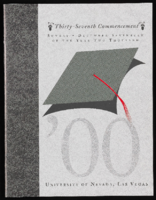
University of Nevada, Las Vegas (UNLV) 37th commencement program
Date
Archival Collection
Description
Commencement program from University of Nevada, Las Vegas Commencement Programs and Graduation Lists (UA-00115).
Text
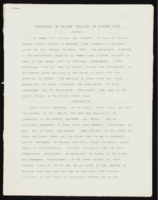
"Stereotypes of Mexicans Projected in Selected Film": manuscript draft by Roosevelt Fitzgerald
Date
Archival Collection
Description
From the Roosevelt Fitzgerald Professional Papers (MS-01082) -- Unpublished manuscripts file.
Text
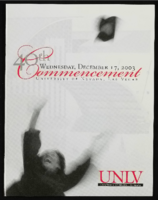
University of Nevada, Las Vegas (UNLV) 40th commencement program
Date
Archival Collection
Description
Commencement program from University of Nevada, Las Vegas Commencement Programs and Graduation Lists (UA-00115).
Text

Emilia Marquez oral history interview: transcript
Date
Archival Collection
Description
Oral history interview with Emilia Marquez conducted by Maribel Estrada Calderón on July 5, 2019 for the Latinx Voices of Southern Nevada Oral History Project. Claytee D. White and Emily Lucile are also present during the interview. Emilia Marquez was born in the United Stated and raised in Alexandria, Virginia, where her father worked as a bricklayer, until the age of twelve, when her father decided to move the family back to Uruguay. She describes acclimating to her new life in middle school and her shift from being perceived as an outsider in Uruguay to accepting Uruguay as home. She describes life in Uruguay and the positions that her family held while living there. After meeting and marrying her husband they trained to work in a casino. She trained as a slot machine operator, and her husband trained as a dealer. This eventually led them to leave Uruguay for the U.S. After the encouragement of her father and mother, she moved with her mother to Las Vegas to work in the casino industry. She describes working as a change person at the Luxor before moving to the newly opened Palms, where she worked until she left it to work at the Wynn. She ends the interview talking about various Uruguayan dishes and traditions, and a brief history of Uruguay. Subjects discussed in this interview: Uruguay, immigration, Las Vegas Strip, Latinx, Luxor.
Text

Gabriel Garcia oral history interview: transcript
Date
Archival Collection
Description
Oral history interview with Gabriel Garcia conducted by Monserrath Hernandez and Barbara Tabach on November 13, 2019 for the Latinx Voices of Southern Nevada Oral History Project. In this interview, Garcia discusses his early life in Arizona and moving to Las Vegas, Nevada in 1984. He remembers attending a sixth grade center, the Pacific Engineering and Production Company of Nevada (PEPCON) explosion, and attending Las Vegas High School. Garcia talks about Mexican culture in Las Vegas, car clubs, and becoming a graphic designer. Lastly, Garcia discusses his involvement with the Association of Latino Professionals for America, and the idea of diversifying the professional workplace.
Text
